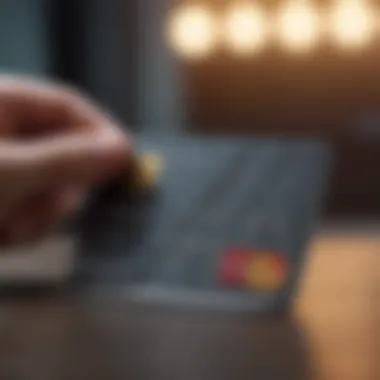Exploring Secured Credit Cards and Their Credit Impact


Intro
Secured credit cards play a significant role in modern credit systems. They help individuals build or rebuild credit scores. Understanding secured credit cards provides insight into how they affect credit reporting and overall financial health. This introduces an important tool for those with little to no credit history or those recovering from credit issues.
Insights on secured cards can empower individuals to make better choices, especially when it comes to finances. Responsible use can lead to improved credit. However, misuse can lead to negative outcomes. Therefore, comprehending how secured credit cards work and their associated benefits and drawbacks is essential.
In the sections ahead, we will dive into core concepts related to secured credit cards, their impact on credit scores, as well as tips for proper usage. This comprehensive view equips readers to navigate the often-complex world of credit wisely.
Understanding Secured Credit Cards
Secured credit cards necessitate a cash deposit that serves as your credit limit. For instance, if you deposit $500, your limit will equal that amount. This design measures risk, as the deposit contends with the concern of lending to those who might not have ideal credit histories.
Benefits
- Rebuilding Credit: For people looking to repair their credit, secured cards provide a starting point. With proper payment behavior, users can see improvements in their scores.
- Low Fees: Often, these cards have lower fees compared to traditional unsecured cards. Users can capitalize on responsible behavior without facing extensive costs.
- Accessible Approval: Approval processes tend to be simpler. This can be especially helpful for those struggling to open traditional credit accounts.
Drawbacks
- Limited Credit Lines: The deposit usually limits the spending. This may not be helpful for those looking to execute larger monetary transactions.
- Risk of Overdrafting: Some individuals may overspend their limit, leading to high fees if mismanaged.
- Potential Transition to Unsecured From Secured: Cash deposit can often be tied to accounts well beyond their payback.
Reporting to Credit Bureaus
A fundamental characteristic of secured credit cards is that they generally report payments and account information to major credit bureaus. FICO and VantageScore, commonly used systems for measuring credit scores, examine repayment history meticulousy. Paying on time builds a favorable credit history. Late or missed payments can deeply harm one's score.
Preface to Secured Credit Cards
Secured credit cards play a vital role in the financial landscape for those with limited or damaged credit histories. They provide an opportunity to not just access credit but also to build a solid credit score over time. Understanding secured credit cards involves grasping not only their definition but also their operational mechanics. This knowledge is particularly significant in the current economic climate where creditworthiness has considerable impact on financial opportunities.
When considering secured credit cards, many factors come into play. Users must reflect on how they differ from other credit options, such as unsecured cards. Additionally, recognizing the responsibilities that accompany secured cards is paramount for success in building or repairing credit.
Definition of Secured Credit Cards
A secured credit card is a type of credit card backed by a cash deposit made by the user. The deposit acts as collateral, leading to a credit limit equal to or below the amount of the deposit. For example, if you deposit $500, your credit limit will typically be $500. This secure setup is designed to mitigate risk for lenders, enabling individuals who may have poor credit histories or banking experiences to qualify for credit.
Secured credit cards can report to the major credit bureaus like Experian, TransUnion, and Equifax. This reporting is critical as it allows responsible usage to positively influence credit scores over time. However, it is also equally important to keep in mind that mismanagement can harm one’s credit profile.
How Secured Credit Cards Work
Secured credit cards operate through a established system involving cash deposits. When a user applies for a secured card, they must put down a specified amount as a security deposit. This deposit not only determines the credit limit but also serves as a safety net for lenders against defaults.
After receiving the card, users can make purchases as they would with regular credit cards. Each month, if the cardholder pays in full and on time, they demonstrate responsible credit usage. Late payments, however, can result in negative marks on the credit report.
A secured credit card uses consumers' deposits as a safeguard, aiding both consumers and lenders in various financial scenarios. Select secure card issuers also provide automation for payments through mobile apps, enhancing user experience.
Users should also be aware of any fees associated with these cards. While the credit limit available depends on the deposit, understanding annual fees, transaction fees, or other charges is crucial before selecting a secured credit card. Navigating these factors diligently allows for an optimized journey towards better credit management.
Importance of Credit Bureaus
Credit bureaus play a crucial role in the financial landscape. They are agencies that collect and maintain consumer credit information throughout their lives. Understanding the workings of credit bureaus is essential, as it directly impacts an individual’s ability to access loans, mortgages, and other forms of credit. Secured credit cards interact significantly with these bureaus, influencing credit reporting and credit scores.


Engagement with credit bureaus allows users to build or repair credit scores through responsible usage of secured credit cards. Since these cards require a deposit, which acts as collateral, they are often easier to obtain for individuals with limited or no credit history. This is beneficial for those who might struggle to access unsecured credit options earlier.
In summary, the importance of credit bureaus rests on their ability to shape one’s financial opportunities. The metrics they use to evaluate creditworthiness affects interest rates, loan availability, and can even inform potential landlords or insurers about the risk profile of an applicant.
What Are Credit Bureaus?
Credit bureaus are organizations that gather detailed information about personal credit histories. They keep records of how consumers borrowed and repaid money. The three major credit bureaus in the United States are Equifax, Experian, and TransUnion. Each bureau has its method of collecting and updating consumer data but generally relies on similar credit information sources like lenders, credit card issuers, and public records.
These bureaus compile credit reports that show a detailed picture of an individual's credit history. This data helps lenders make informed decisions when evaluating credit applications.
How Credit Bureaus Assess Credit Worthiness
Credit bureaus use complex algorithms to assess creditworthiness. They mostly consider the following factors:
- Payment History: Timeliness in making payments can positively impact a credit score.
- Credit Utilization Rate: This is analyzed from your overall credit account usage in relation to credit limits. Lower utilization usually helps raise scores.
- Length of Credit History: Longer histories typically indicate more experience with credit management.
- Types of Credit Accounts: Having a variety is preferable. This can include credit cards, retail accounts, and installment loans.
- Recent Inquiries: New applications for credit can have a temporary negative effect, leading to short-term depletion of score because they suggest increased risk.
Understanding these assessment criteria is key for individuals utilizing secured credit cards. When you frequently manage payments responsibly while using a secured credit card, you essentially present a reliable profile to bureau assessments. In this regard, taking actionable steps toward positive financial behaviors directly enhances your overall credit health.
Reporting Practices of Secured Credit Cards
Understanding the reporting practices of secured credit cards is a critical part of grasping how these financial tools can influence credit history. The way these accounts are reported affects not only individual credit scores but also the broader insights into a person’s credit behavior. Secured credit cards, though beneficial in building credit, require an awareness of their reporting dynamics to maximize effectiveness.
Do Secured Credit Cards Report to Credit Bureaus?
Yes, most secured credit cards do report to the major credit bureaus, including Experian, TransUnion, and Equifax. This means that responsible usage of the card can help improve a credit score over time. When you make timely payments, the positive information flows to these bureaus. Yet, not all secured cards report in the same manner. Potential cardholders should verify this before opening an account. Poor management, like missed payments, will also be reported and can have detrimental effects on a credit score.
The reason behind reporting is rooted in the very function of a secured credit card. They aim to assist individuals in creating or refining their credit profiles. Be sure to read the specific terms of the card you are considering, as practices might differ from one issuer to another. Some credit builders may feel misled when they find out about differences in how their secured credit card impacts their credit report.
Differences Between Secured and Unsecured Credit Cards
The primary distinction between secured and unsecured credit cards lies within their underlying structure and the associated risks for lenders and borrowers.
- Collateral Requirement: Secured credit cards are tied to a cash deposit that serves as collateral. Unsecured credit cards do not require such security.
- Credit Limit Control: With secured cards, your credit limit typically matches your deposit. For unsecured cards, the limits can vary widely depending on a person’s creditworthiness.
- Credit History Impact: Both types of cards report to the credit bureaus; however, unsecured cards typically reflect a wider spectrum of financial discipline. Hence, defaulting on unsecured accounts could mitigate future borrowing capacity more significantly than defaulting on secured counterparts in the long term.
Understanding these differences is crucial since it influences decision-making for someone looking to improve their credit profile. Secured cards provide an accessible entry point into credit for many individuals with limited histories. Still, one should assess their own financial situation and the long-term implications of each card type before committing.
“Knowing the specifics of how your card actions impact credit scores is vital for managing financial health.”
In summary, comprehending the reporting practices of secured credit cards enhances transparency. This knowledge allows users to take proactive steps in managing their credit histories while utilizing credit effectively.
Impacts on Credit Scores
Understanding how secured credit cards affect credit scores deeply enriches one's knowledge of personal finance. Credit scores play a pivotal role in determining one’s potential for obtaining loans or applicable credit accounts. Secured credit cards both empower and challenge users regarding how they manage their finances. Not only do they provide an opportunity to improve one's credit score, but they also present some risks associated with mismanagement. This balance is crucial for individuals who want to navigate the complex landscape of credit effectively.
How Secured Credit Cards Influence Credit Scores
Secured credit cards can significantly impact individual credit scores. By using them responsibly, users can build a positive credit history, which is fundamental in boosting scores.
- Payment History: About 35% of a credit score is comprised of payment history. Using a secured credit card, consistently making on-time payments can show lenders that the individual is responsible, despite starting with minimal credit.
- Credit Utilization Ratio: This ratio impacts 30% of a credit score. Having a secured credit card can influence this by keeping balances low relative to the credit limit, often leading to score improvements.
- Length of Credit: Credit scoring models usually favor a longer credit history. Secured credit cards can contribute positively as they add to an individual's account age when maintained timely.
- Types of Credit: Diversifying credit types signals financial responsibility, making secured cards feel valuable in demonstrating management of both secured and unsecured debts. Overall, active use of secured credit cards serves as a foundation toward building better credit scores over time.


Positive Effects of Responsible Usage
The notion of responsible usage is key to fostering credit health. A secured credit card used wisely can yield several benefits:
- Improvement of Credit Score: Regular use and prompt payment can drive scores higher. Lenders see this as a bright signal for future credit pursuits.
- Transition to Unsecured Card: Some credit card issuers often convert a secured card to an unsecured one after a track record of positive financial behavior has been established. This transition allows access to higher credit limits without needing a security deposit.
- Increased Confidence in Managing Credit: Engaging with a secured card promotes learning experiences about maintaining good credit habits. Understanding payment timelines, utilizing credit limits, and keeping track of expenses leads to substantial financial confidence.
“Secured credit cards are not just tools; they can become pivotal change agents in one’s financial narrative.”
However, the positive effects are contingent on maintaining a responsible approach in using secured credit cards.
Negative Effects of Mismanagement
Conversely, mismanagement of secured credit cards presents various pitfalls. The adverse consequences can impact not only personal financial well-being but also the credit score:
- Missed Payments: Failing to fulfill monthly payment obligations denotes a negative payment history, likely causing immediate score drop.
- High Credit Utilization: Exceeding a recommended utilization ratio can signal difficulties to lenders and alert them to potential financial strain.
- Diminished Ability to Obtain Unsecured Credit: If a person repeatedly mishandles a secured credit card, lenders may see it as a red flag, limiting future unsecured credit opportunities despite responsible payment history elsewhere.
Proper utilization of secured credit cards can pave the way for stability, while mishandling could easily unravel those potential benefits. This comprehensive exploration of its impacts emphasizes how pivotal such financial instruments are in defining one’s overall credit journey.
Comparative Analysis of Credit Products
The comparative analysis of credit products is essential in understanding how secured credit cards fit into the broader financial landscape. This section highlights the distinctions between secured credit cards, debit cards, and prepaid cards. By exploring these differences, we can uncover unique benefits and potential limitations, helping individuals to make more informed financial decisions.
Secured Credit Cards vs.
Debit Cards
Secured credit cards and debit cards serve different purposes, though they may appear similar at first glance. A secured credit card requires a cash deposit that acts as collateral and credit limit. Iif the deposit is $500, the credit limit is usually equal to that amount. On the other hand, a debit card allows individuals to spend money directly from their bank account without incurring debt.
Some key differences include:
- Impact on Credit Score: Secured credit cards can positively affect credit scores through responsible usage. Debit cards do not impact credit scores, as they do not require any borrowing activity.
- Building Credit History: Using secured credit cards helps in building a credit history. Debit cards do not contribute to credit reports and thus do not help in establishing a credit profile.
- Banking Requirements: Secured credit cards often require an affiliation with a bank or credit union, while debit cards are usually linked to a checking account.
- Rewards and Benefits: Many secured credit cards offer rewards or cash back on purchases, unlike debit cards, which generally lack these financial incentives.
Secured Credit Cards vs.
Prepaid Cards
Secured credit cards and prepaid cards are also fundamentally different despite their similarities. Prepaid cards are loaded with money upfront, while secured credit cards are linked to a deposit that acts as both collateral and a credit limit. Using these two types of financial products can lead to distinct outcomes.
Important distinctions include:
- Credit Reporting: Secured cards report payment history to credit bureaus, enabling users to potentially improve their credit scores. Prepaid cards, however, are not reported to credit bureaus.
- Spending Flexibility: Secured cards offer a revolving credit line, meaning you can borrow up to your credit limit and pay it back. Prepaid cards only allow users to spend the amount already loaded, limiting their credit utilization.
- Fees: Some secured credit cards may have annual fees or monthly maintenance costs. Prepaid cards often come with transaction fees or monthly service fees, which could make them less cost-effective.
In analyzing these comparative factors, it becomes evident that secured credit cards provide unique benefits regarding credit building and financial management. Their structure aids consumers in transitioning from poor to better credit management, reinforcing credit differences in financial products and practices. Understanding these distinctions supports a more tactical approach to establishing solid financial habits and credit scores, serving as a reminder of the comprehensive nature of credit reporting and its implications for personal finance.
"Consumers must assess their needs and financial goals before choosing a credit product for optimal benefit."
Overall, this analysis not only showcases the specific attributes of secured credit cards but also educates individuals about effective use of other financial products. The insights gathered from this section contribute to grasping the nuanced role of secured credit cards, informing potential users on how to strategically leverage their features.
Choosing the Right Secured Credit Card


Selecting a secured credit card can significantly influence your credit building journey. It is vital to understand what features should be prioritized. Among available options, not every secured credit card will suit every individual's financial situation. The right choice simplifies responsible credit usage, fostering healthy financial habits.
Key Features to Consider
When evaluating secured credit cards, focus on the following key features:
- Annual Fees: These vary significantly across cards. A high fee may undermine the benefits obtained from rebuilding credit.
- Minimum Security Deposit: This requirement is inherent to secured cards. Choose a card that fits comfortably within your budget.
- Interest Rates: While ideally payments should be made in full, emergency situations may warrant a carry of the balance. Assess the rate to avoid excessive interest costs.
- Account Management Tools: Many issuers provide online access, enabling easy tracking of spending and payment due dates.
In essence, plainness in features often signifies better usability.
Assessing Fees and Deposits
Understanding fees and deposits is crucial when selecting a secured credit card. Depositional elements must resonate with individual financial capacities.
- Security Deposit: This is typically secured with the card. The deposit reflects the credit limit. This amount is entirely within applicant's control.
- Hidden Fees: Read the fine print. Numerous cards include activation, maintenance, or transaction fees. Such expenses quickly accumulate.
- Transitional Fees: Some issuers might impose a charge for international transactions, either flat or as a percentage.
Before signing agreements, ensure calculation of all associated costs. Taking time to analyze and inquire leads to better choices being made. Understanding card policies is an essential part of effective financial management.
Best Practices for Using Secured Credit Cards
Using secured credit cards effectively requires a strategic approach. Responsible usage can significantly improve credit scores while protecting individuals from pitfalls associated with credit mismanagement. This section outlines best practices that assist users in maximizing the benefits of secured credit cards while minimizing risks.
Developing a Responsible Payment Habit
Establishing a reliable payment habit is a cornerstone of effective credit management. Always aim to pay off the balance in full each month. This action not only prevents interest from accruing but also enhances one’s credit score. Set up automatic payments. This ensures timely transactions and the reduction of missed payments, which can detrimentally affect credit scores.
Consider using budgeting tools or apps to track spending and payments. By managing expenditure, it becomes easier to avoid overspending on the card. Consistency is crucial. Making smaller purchases regularly can help maintain balance within spending limits, fostering a healthy repayment history. Overall, being mindful in spending and payments is key to developing strong financial habits.
Monitoring Your Credit Report
Regularly checking your credit report cannot be overstated. A close watch helps individuals understand how secured credit cards affect their credit history. Access these reports at least once a year, allowing you to see where you stand financially. Use AnnualCreditReport.com, a reliable resource that provides a free credit report annually.
When reviewing your report, look for inaccuracies. Mistakes on a credit report can lead to an unjustly low credit score. If any errors are spotted, report them to the responsible credit bureau for correction. Furthermore, monitoring assists in understanding the impact of payments and balances over time. This arms users with insights and the necessary information to adjust their financial strategy based on current credit standing.
Effectively managing secured credit cards can lead to improvement in one's credit score. Continuous evaluation of your habits is important.
Closure
Secured credit cards serve a significant purpose for many consumers. They offer a pathway to build or rebuild credit. This is crucial as a healthy credit score impacts numerous financial aspects including loan approvals, interest rates, and other credit-related products.
Recap of Key Findings
Before concluding, it is important to summarize the main takeaways from the discussions throughout this article. Secured credit cards require a cash deposit that acts as collateral. They report to credit bureaus, influencing one’s credit score positively when used responsibly. Positive behaviors such as paying on time and maintaining a low credit utilization ratio lead to improved credit scores. On the downside, mismanagement can result in significant negative consequences.
- Betetr Borrowing Options: Secured credit cards can enhance credit scores through on-time payments.
- Low Risk: The cash deposit lowers the risk for creditors, making these cards accessible.
- Potential Drawbacks: Fees and interest rates vary between products, and inappropriate use can limit credit progress.
Final Thoughts on Secured Credit Cards
Ultimately, secured credit cards represent an important segment of the financial ecosystem for people who need to improve their credit status. Assessing the right card involves looking beyond promotional offers or low initial fees. Understanding all dimensions, including fees, terms, and the potential to transition to unsecured cards, is necessary for informed decision-making.
In contemplation of entering a journey towards credit restoration or establishment, one must navigate with care. Approaches should emphasize responsibility. Utilization of educational resources can assist individuals in making sensible choices—and in doing so, potentially leading to a healthy credit profile in a future ahead. Ensure to monitor progress regularly against major credit bureaus to stay informed.
Balanced credit behavior—consisting of timely payments and limited debt—will significantly increase earning credit scores in less time.
People must remember that even small shifts in habits can manifest disproportionately impressive results in one’s financial discussions. Make the most of secured credit products wisely, allowing space for prospective financial behaviors even beyond the card's scope.







